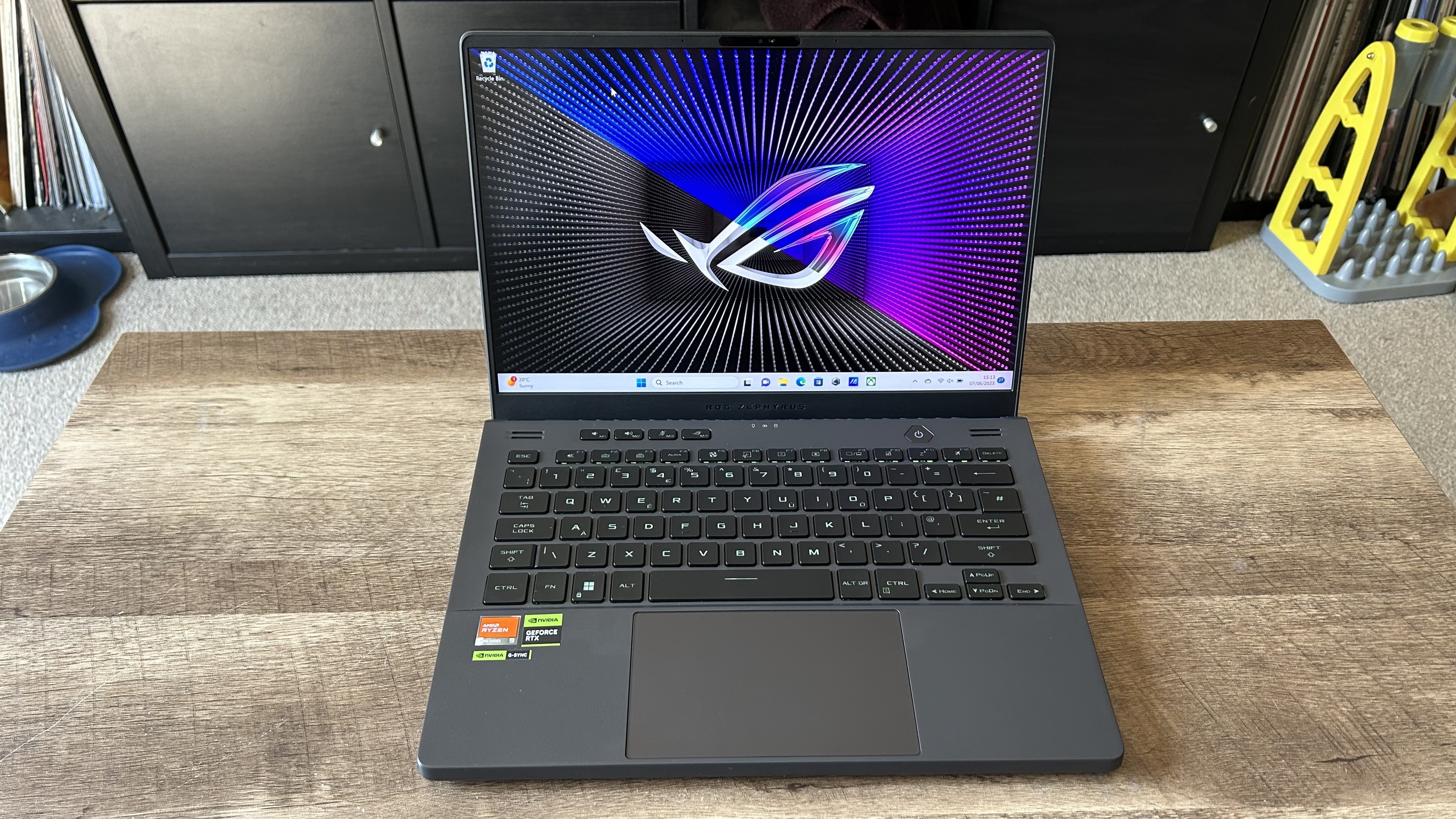GamesRadar+ Verdict
The Asus ROG Zephyrus G14 still rules the roost when it comes to compact performance. The balance between portability and power is so finely struck here it feels like you're getting the best of both worlds - all wrapped up in a slick chassis. Nvidia is back to give your graphics that boost, but like many of this year's gaming laptops, that RTX 40-Series GPU is going to shift the price up as well.
Pros
- +
The perfect mix between portability and power
- +
Slick design and subtle aesthetic
- +
Durable and reliable build quality
- +
Return to Nvidia graphics makes for excellent performance
- +
Impressive speaker system
Cons
- -
Mini LED display isn't as slick as other 2023 options
Why you can trust GamesRadar+
Recent updates
February 14, 2024 - There is a new 2024 Asus ROG Zephyrus G14 now on the shelves. The latest version adds a new OLED panel to all its configurations with a redesigned form factor to offer a more ultrabook-like design. It's thinner and lighter than the model reviewed here, but does drop RTX 4080 and RTX 4090 configuration options to achieve this slimline profile. Our original review continues below.
The Asus ROG Zephyrus G14 is back, with a suite of hardware improvements under the hood and a shiny new Mini LED display on the top end configurations. Considering this has long been one of the best gaming laptops on the market, this 14-incher has some seriously impressive boots to fill.
Thankfully, Asus has kept the majority of what we know and love about the Zephyrus G14 the same. This is still a Goldilocks machine, packing plenty of power into a compact, easily portable chassis. No, it's not the smallest machine available and it's not the most powerful - but in trying to be neither the G14 has always managed to pull off a particularly enticing proposition.
When I reviewed 2022's model, I celebrated and lamented the fact that it was a fully AMD build. There's plenty of power in those Ryzen processors, but it just couldn't keep up with Nvidia in the graphics department. Today, Asus is rolling out the best of both worlds. 2023's iteration will still lean on the speed of the AMD Ryzen 9 7940HS / Ryzen 7 7735HS, but the picture has been handed back to Nvidia - all the way up to an RTX 4090.
After gleefully welcoming another Asus ROG Zephyrus G14 into my life, I sat down for three weeks to see where this new tech is taking the portable powerhouse.
| Specs | Tested | Also Available |
|---|---|---|
| Price | $3,799 / £3,599 | $1,599.99 upwards / £1,899 upwards |
| Display | 14-inch QHD+ Mini LED @ 165Hz | 14-inch QHD+ IPS @ 165Hz | FHD+ IPS @ 144Hz |
| Processor | AMD Ryzen 9 7940HS | AMD Ryzen 7 7735HS |
| GPU | RTX 4090 | RTX 4060 | RTX 4070 | RTX 4080 |
| RAM | 32GB DDR5-4800 | 16GB DDR5-4800 |
| Storage | 1TB PCle 4.0 SSD | 512GB PCle 4.0 SSD |
| Connectivity | WiFi 6E, Bluetooth 5.3 | - |
| Ports | 1x 3.5mm audio, 1x HDMI 2.1, 1x USB-C 3.2 Gen 2, 2x USB-A 3.2 Gen 2, 1x USB-C 4 (Display Port + PD), 1x Micro SD card reader | - |
| Dimensions | 31.2 x 22.7 x 2.05cm | 31.2 x 22.7 x 1.95cm |
| Weight | 1.72Kg | 1.65Kg |
Design
- Compact footprint and sturdy portable form factor remain
- Subtle aesthetic that will fit in anywhere
- Soft touch aluminium construction feels reliable
The G14 hasn't aged too much in its 2023 iteration. The latest model sits very much inline with its predecessors, a slick aesthetic in a compact chassis. Wrapped up in the same magnesium alloy materials, it offers a solid, dense feel which certainly made taking it on the road for a week considerably less nerve wracking. Add soft rounded corners and a relatively light 1.7kg form factor and 2023's G14 is as trip-ready as it ever was.
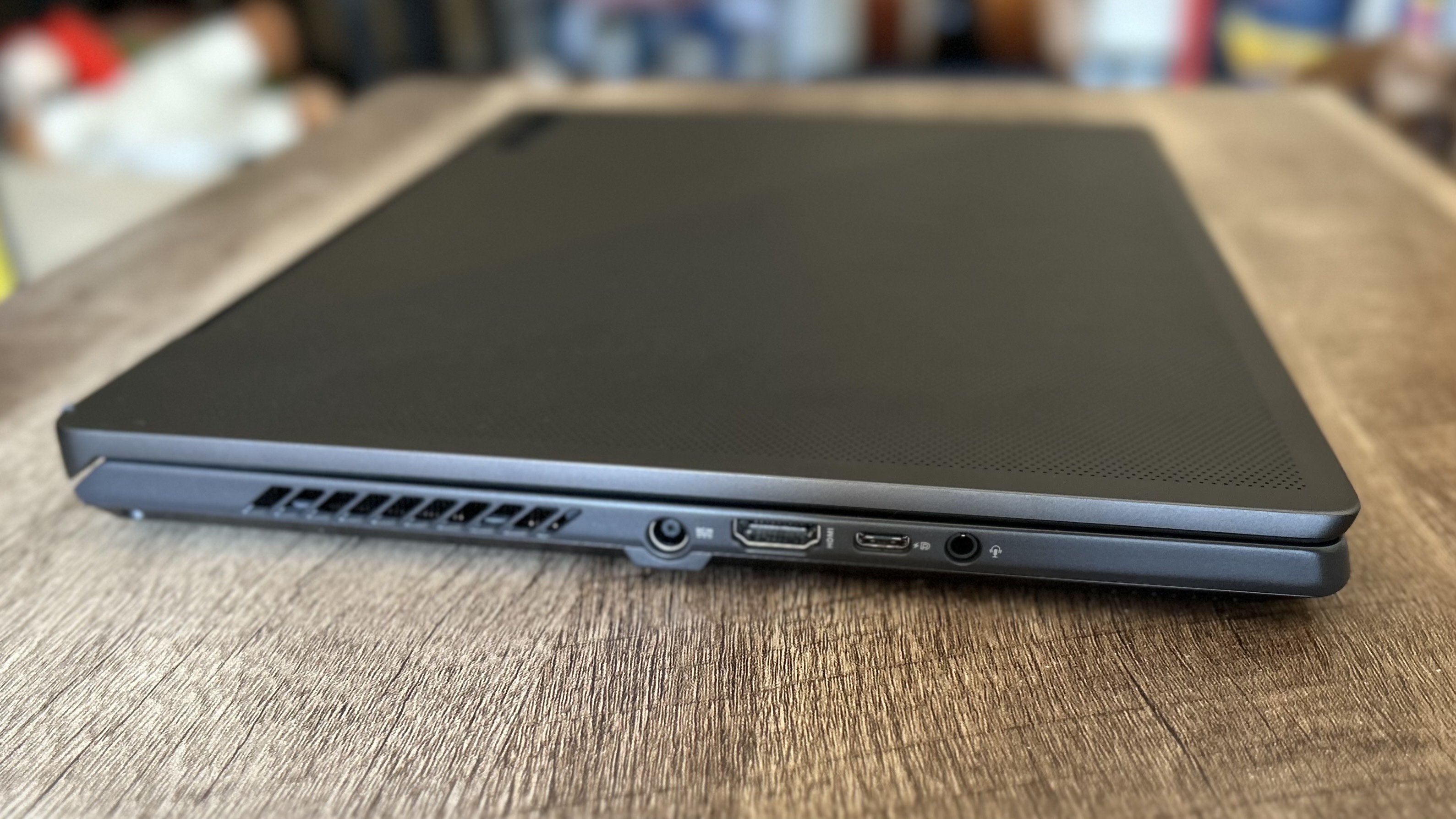
We received the top-shelf MiniLED display version, which doesn't feature Asus's AniMe Matrix LED panel along the back of the lid. I'm not convinced anyone's going to miss it in this high-end configuration, and it's a worthy trade for the extra weight of that display. You'll still find this grid of configurable lights in lower-rung configurations, but be wary that it does add a little extra heft and cost. Without those LEDs installed, our unit still carries a dotted section set at an angle across the majority of the lid, but that's the extent of the external aesthetics. This certainly isn't a gamerfied laptop, perfectly cementing it as an all-in-one device for work and play on the go.
Lifting that screen reveals a particularly sturdy hinge, which lifts the main body slightly below the top lid to provide extra ventilation and add height to the typing experience. I'm a personal sucker for this laptop design. It adds a sense of luxury while also providing crucial cooling, and feels all the more comfortable for it. Considering those hinges can take you all the way to 180 degrees without any concerning wobbles, this is a particularly well designed system.
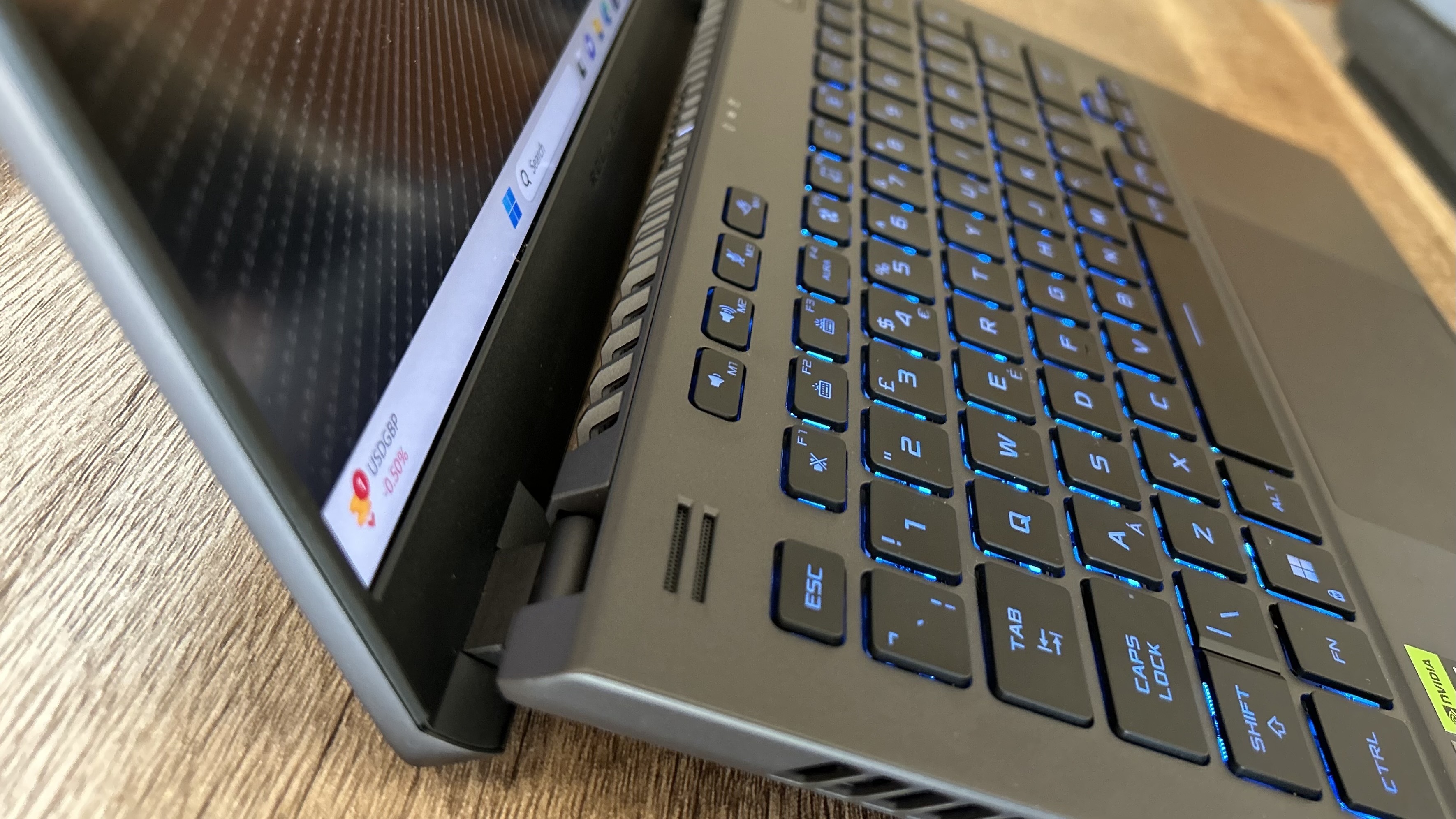
The main body is made up of a standard, nicely spaced keyboard (I greatly appreciated this breathing room after cramping over the Razer Blade 18's deck), as well as a soft, roomy touchpad. That touch panel is the same size as the previous version, and uses the same glass-top design, but doesn't quite feel as slick as the previous iteration. Feedback is still incredibly responsive, and each tap feels satisfyingly tactile, but I wasn't as blown away by this version.
Features
- Nvidia GPUs return for a boost in graphics
- Fantastic speaker system and performance
- Mini LED display isn't as premium as other 2023 Asus laptops
The G14 remains an AMD outlier in the world of Asus gaming laptops. Unlike the previous iteration, though, you're still picking up an Nvidia graphics card - which makes all the difference when it comes to high end features like ray tracing performance. That could be a generational difference; AMD is certainly bringing its A-game with its Radeon RX 7000 GPUs this year - but side by side, the 2023 G14 greatly benefits from Nvidia's latest tech.
You also get the luxury of more choice here. The G14 is available with RTX 4060, 4070, 4080 and 4090 graphics card options, which means you won't need to spend $3K+ if you won't need top of the range visuals. The cheapest 144Hz IPS display and RTX 4060 graphics card, with 16GB RAM and a 512GB SSD, will come in far closer to $1,000 than it will $2,000.
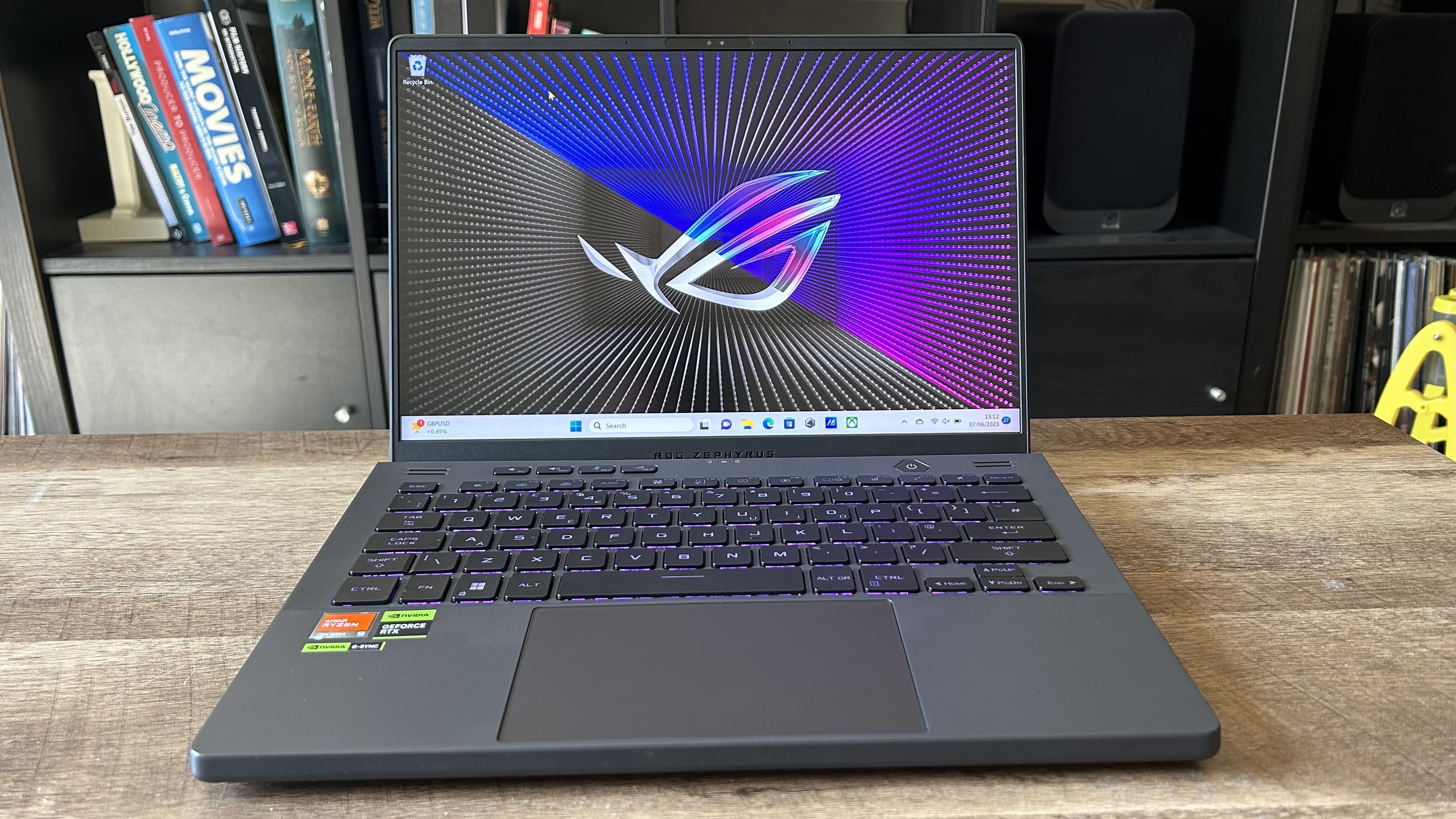
All that power is keeping the display up top looking its best. Unfortunately, the Mini LED Nebula HDR screen found on the top-end RTX 4090 configuration (the model I've been testing) isn't quite as luxurious as the panel you'll find on the Asus ROG Strix Scar 16 or Asus ROG Zephyrus M16. With 504 dimming zones compared to the 1,024 on the larger models, as well as 600 nits of peak brightness vs 1,100, this is a reduced experience. The results are tangible - while I was blown away by the contrast and dynamic picture quality on the previous devices, this screen felt a lot more last-gen.
Of course, that HDR engine is still whirring away to provide a rich experience when streaming and in-game, but that wow factor wasn't quite as powerful here. Asus does get away with it on a smaller screen - everything is naturally a lot tighter anyway - which means packing the full whack may have inflated the price point beyond reconcilable value.
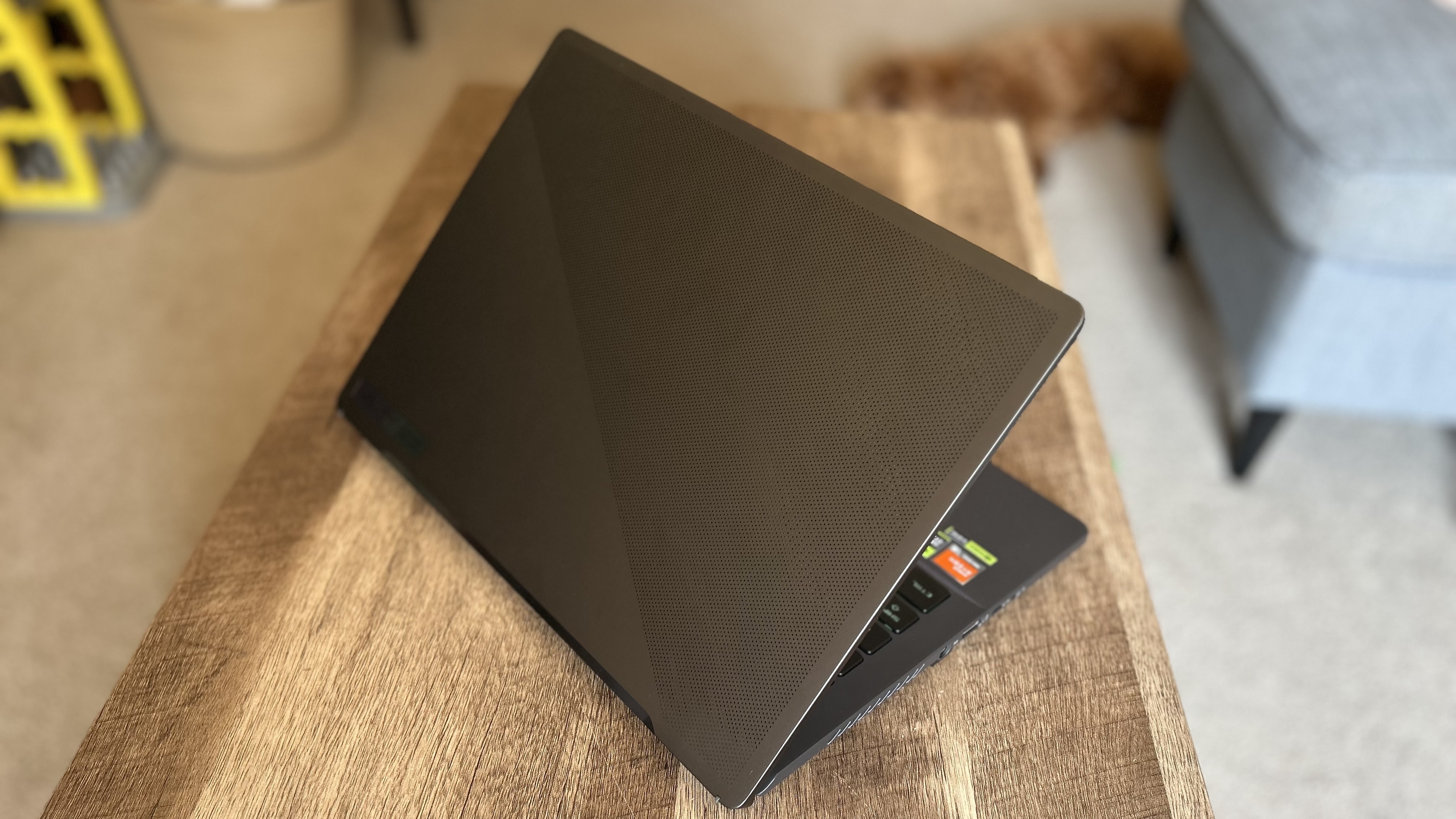
The actual machine boasts a slim selection of additional features to keep that weight and form factor, as well as the base price, low. The speaker system is certainly powerful, and took me by surprise the most when first loading up. Asus has always produced well-balanced, robust speakers on its laptops, but the quad-array here is particularly effective - especially considering it's housed in a smaller body. Dolby Atmos provides virtual 5.1.2-channel surround sound for greater depth as well.
Ports are bountiful with a USB-C on each side (with a direct line to the Nvidia GPU on the right), HDMI 2.1, 3.5mm audio jack, two USB-A 3.2 Gen 2, and a Micro SD card reader. Up top you've also got a FHD webcam, which suffices for everyday meetings and the odd streaming session when you're away from your full setup.
Performance
- Performance is well above last year's model
- Some settings might have to be tweaked once temperatures climb
- Framerates remain steady between High and Ultra settings
The Asus ROG Zephyrus G14 has been turbo charged in its latest iteration. Like for like numbers across Shadow of the Tomb Raider and Total War: Three Kingdoms show just how far these new components and additional cooling features can take us, posting framerates well above 150fps in 1080p and staying consistently above 100fps in 1440p (aside from a drop in Ultra settings) as well. Considering we were struggling to reach three figures in any of our QHD+ benchmarking on the previous generation, that's astounding. For reference, we saw jumps of between 50 and 87% in performance compared to the previous generation's framerates.
Time Spy: 13,867
Fire Strike: 30,642
PC Mark 10: 7,864
Cinebench: Multi - 15,753
Crystal Disk Mark: 6,642MB/s read / 4,927MB/s write
Those in-game numbers aren't going to compete with larger, more performance-oriented devices like the Strix series or the M16, but considering the compact form factor they're still incredibly impressive. I was flying through High on Life environments, and when I wasn't ziplining without dropping a single frame or watching dozens of greebles filling the screen, I was stopping to enjoy the vivid textures of the jungle and dynamic lighting of Dreg Town. Temperatures did climb, but considering the condensed design, the G14 handled heavy loads with aplomb. Plus, the thermometer never reached concerning levels.
| Row 0 - Cell 0 | 1080p | 1440p |
| Shadow of the Tomb Raider | High: 165fps | Highest: 153fps | High: 130fps | Highest: 124fps |
| Total War: Three Kingdoms | High: 145fps | Ultra: 118fps | High: 117fps | Ultra: 86fps |
| Rainbow Six Extraction | High: 238fps | Ultra: 192fps | High: 170fps | Ultra: 141fps |
| Returnal | High: 131fps | Epic: 124fps | High: 122fps | Epic: 121fps |
| Hitman 3 | High: 121fps | Ultra: 115fps | High: 114fps | Ultra: 110fps |
What was most notable from dedicated in-game benchmarking, though, was the lack of a real need to dip below Ultra settings. In general, even at 1440p, numbers were particularly steady - Returnal offered up just 1fps difference between High and Epic settings, and Hitman 3 trucked along at 114fps in High, only dipping to 110fps in Ultra. The only result that disappointed in this regard was Total War: Three Kingdoms, which came back at 86fps in Ultra. Overall, then, you really can have it all here.
Stress tests confirm that as well. Fire Strike and Time Spy scores are 40% and 60% up in this year's generation respectively, posting numbers that don't sit too far away from the far chunkier Asus ROG Strix Scar 16. Not only does that bode well for the efficiency of high-end components in a smaller form factor, but it also makes the Asus ROG Zephyrus G14 even more competitive with far larger systems.
Should you buy the Asus ROG Zephyrus G14 (2023)?
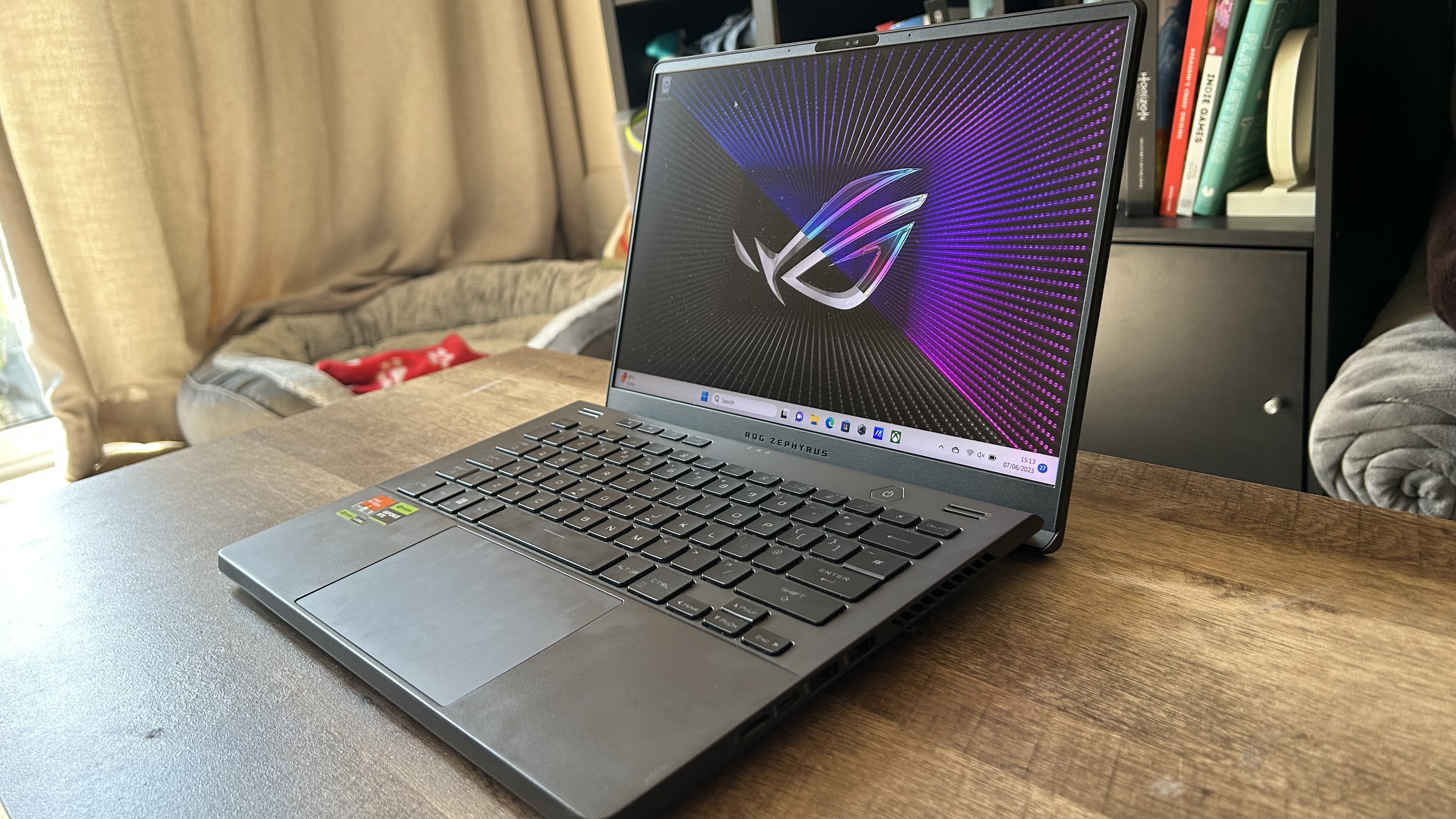
Anyone on the hunt for a 14-inch gaming laptop needs to be looking at the Asus ROG Zephyrus G14. It's a pricey option, but so are the rest of this year's RTX 40-Series lineup, and you're certainly getting your money's worth in portability and power. That's not something I can say too often. The majority of gaming laptops lean into one aspect of use rather than trying to strike a balance between the two. The G14 not only proves you can hit both with the latest components under the hood, but do it in style.
Not only that, but the performance jump is so large that I would also recommend the swap to anyone thinking of upgrading their 2021 or even 2022 model. Whether you're looking to boost framerates or just maintain more stability overall, there's a tangible leap here in terms of raw power.
I'm yet to get my hands on competitors, but the Alienware x14 is going to be one of the biggest options on the market. The Alienware x14 does come in thinner and lighter, but carries a larger square footprint overall and is limited to an RTX 4060 GPU at the top end of the scale - for not dissimilar prices. On paper alone, the G14 is easily the better investment.
How we tested the Asus ROG Zephyrus G14
I used the Asus ROG Zephyrus G14 as my daily driver for two weeks, using the device for all daily work, play, browsing, and streaming. One week of that time was spent with the laptop hooked into a monitor setup with another spent solely on the machine itself. During everyday play, I used the G14 to run High on Life, Cities Skylines, and Atomic Heart while also stress testing across 3D Mark and PC Mark 10 benchmarks and in-game tools on Shadow of the Tomb Raider, Total War: Three Kingdoms, Returnal, Hitman 3, and Rainbow Six: Extraction. For more information on how we test gaming laptops, check out the full GamesRadar+ Hardware Policy.
For something more permanent, we're also rounding up the best gaming PCs on the market. Or, if you're after a different brand, check out the best Alienware laptops and the best Razer laptops available.

Managing Editor of Hardware at GamesRadar+, I originally landed in hardware at our sister site TechRadar before moving over to GamesRadar. In between, I've written for Tom’s Guide, Wireframe, The Indie Game Website and That Video Game Blog, covering everything from the PS5 launch to the Apple Pencil. Now, i'm focused on Nintendo Switch, gaming laptops (and the keyboards, headsets and mice that come with them), PS5, and trying to find the perfect projector.

